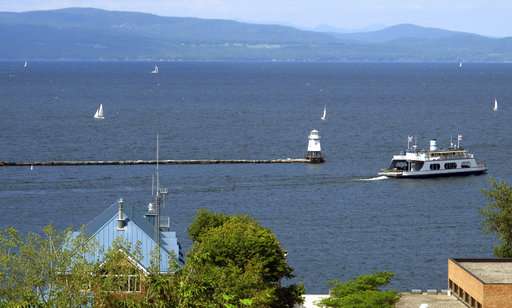Program that studies Lake Champlain qualifies for up to $1M

Two decades after the diminutive Lake Champlain was ridiculed for its brief listing in federal law as one of the Great Lakes, a program that studies the lake has won a designation that could more than double its government funding—up to $1 million annually.
The National Oceanic and Atmospheric Administration announced Wednesday that the Lake Champlain Sea Grant Program has qualified as an "institute," which could boost its federal funding 150 percent, from $400,000 annually to $1 million a year. The money will used to help scientists understand and clean up the lake.
The Lake Champlain program earned the designation "by demonstrating excellence in research, education and public service," NOAA said.
The program "has clearly shown a high level of achievement," said Craig McLean, assistant administrator of NOAA Research.
U.S. Sen. Patrick Leahy cleared the path for the new designation in 1998, when he gave Lake Champlain official designation as one of the Great Lakes in a bill providing federal research money for the lakes. It was listed alongside lakes Ontario, Erie, Huron, Michigan and Superior despite being dwarfed by each and located in a different region of the country.
The narrow, 120-mile long (193 kilometers) lake is located between Vermont and upstate New York with a tiny portion reaching into Quebec, Canada. The Great Lakes border eight U.S. states, most in the Midwest, and Ontario, Canada. They cover an area of 94,250 square miles (244,106 square kilometers).
A Page 1 headline in the Detroit News and Free Press read, "Great Lakes get a little brother; now there are 6. Pond in Vermont wins status battle." Former Ohio U.S. Rep. Steve LaTourette mocked: "If Lake Champlain ends up as a Great Lake, I propose we rename it 'Lake Plain Sham.'"
The listing lasted slightly less than two months. While Lake Champlain is no longer considered one of the Great Lakes, the research designation that came with the listing remained. And Leahy takes the credit for that.
"He took the heat for that, but it allowed us to establish the Lake Champlain Sea Grant program here," said University of Vermont Professor Breck Bowden, who heads the Lake Champlain program.
While Lake Champlain is a fraction of the size of the Great Lakes, scientists who focus on the larger lakes can learn from the smaller lake, said Greg Boyer, director of the Great Lakes Research Consortium, which includes 18 colleges and universities in New York and nine in Canada.
In many ways Lake Champlain is more complex than some its larger relatives, said Boyer, who called Lake Erie, for example, "a very big mud puddle."
"I can see logic on both sides. It really isn't the same size as the Great Lakes. It's more like a very large Finger Lake," Boyer said, referring to the 11 lakes in western New York.
The Lake Champlain program was founded in 1999 as a "project" of the National Sea Grant College Program, which was established in 1966 to help maintain a healthy coastal environment and economy.
The Lake Champlain program is a cooperative effort by the University of Vermont and the State University of New York College at Plattsburgh. The extra funding will allow the program to expand to New York, offer educational program for middle and high school students and expand partnerships with state and private organizations.
© 2018 The Associated Press. All rights reserved.

















